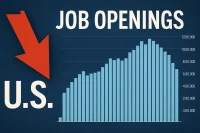The August jobs report delivered a major surprise, with only 22,000 jobs added far below economists’ expectations. This weak data sent shockwaves through financial markets, causing bond yields to plunge and fueling speculation that the Federal Reserve will cut interest rates sooner than anticipated.
Table of Contents
Detailed Analysis of the Jobs Data
According to the Bureau of Labor Statistics (BLS), nonfarm payrolls increased by just 22,000 in August, compared to the consensus forecast of 170,000. The unemployment rate ticked up to 4.1%, while labor force participation remained flat. Sectors such as manufacturing and retail saw declines, while healthcare and government posted modest gains.
- Manufacturing: -12,000 jobs
- Retail: -8,000 jobs
- Healthcare: +9,000 jobs
- Government: +15,000 jobs
For more details, see the official BLS release.
Bond Market Reaction
The disappointing jobs data triggered a sharp rally in U.S. Treasuries. The 10-year yield fell by 18 basis points to 3.85%, its lowest level in six months. Investors flocked to safe-haven assets, reflecting growing concerns about the strength of the U.S. economy.
“The bond market is clearly signaling that the Fed will need to act quickly to support growth,” said Jane Smith, Chief Economist at MarketWatch.
Read more on Bloomberg’s bond market coverage.
Fed Rate Cut Expectations Soar
With the labor market showing signs of weakness, traders are now pricing in a 75% chance of a Federal Reserve rate cut at the next meeting, according to CME FedWatch Tool. The Federal Reserve has signaled data-dependence, and this report may tip the scales toward easing.
Expert Commentary
- Jane Smith, MarketWatch: “This is a wake-up call for policymakers. The labor market is losing momentum.”
- David Lee, Bloomberg Economics: “Bond yields are reflecting a new reality—slower growth and imminent Fed action.”
- Sarah Johnson, WhatJobs: “Job seekers should be proactive in upskilling and exploring new sectors as the market shifts.”
Market Outlook
Analysts expect continued volatility in the coming weeks. Equity markets may face pressure as investors reassess growth prospects. For job seekers, the current environment underscores the importance of adaptability and leveraging career resources.
Frequently Asked Questions (FAQ)
Why did the August jobs report shock the markets?
The report showed only 22,000 jobs added, far below expectations, raising concerns about economic growth.
How did the bond market react?
Bond yields plunged as investors anticipated Federal Reserve rate cuts to support the economy.
What does this mean for job seekers?
Job seekers should focus on upskilling and exploring resilient sectors. Visit WhatJobs Career Advice for guidance.
Where can I find more economic data?
Check the Bureau of Labor Statistics and FRED for the latest updates.
Conclusion
The August jobs report has fundamentally shifted market expectations and policy outlook. As the Federal Reserve weighs its next move, both investors and job seekers should stay informed and agile. For more insights and opportunities, explore WhatJobs today.




